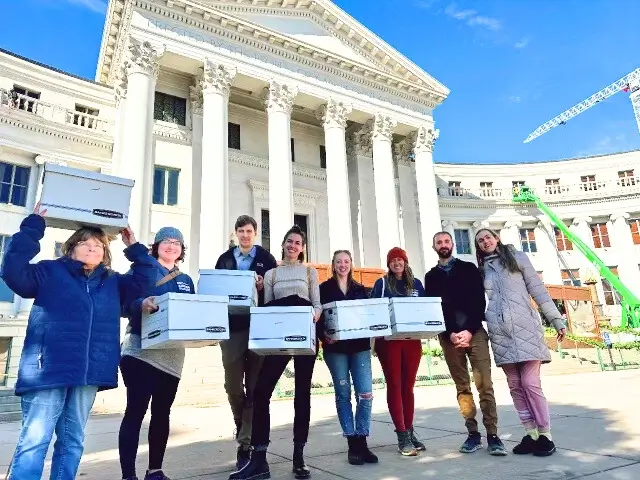Photos and videos available for use here.
A group of local residents embarked in May to qualify two pro-animal measures for Denver’s ballot. Successfully reaching the required amount of signatures within the six-month deadline, they submitted the petitions this Thursday for approval by the City. If enough signatures can be validated, Denver will add both a fur ban and a slaughterhouse ban to the ballot questions for the November 2024 election.
Celebrating their victory in front of the Denver Elections Division office, Pro-Animal Future advocates walked in Thursday morning to deliver six large boxes filled with signatures. Addressing the gathering, campaign director Brent Johannes said, “The vast majority of Americans are against animal cruelty. Plus, there’s rising concern for the trauma workers face from killing hundreds of animals each day. Note that the slaughterhouse in Denver also pollutes the air and water of an already marginalized neighborhood. These measures empower citizens to vote for the better world that our local neighbors and animals deserve.”
Following the delivery of the signatures, Johannes and 11 other advocates held a peaceful protest last night outside of Overland Sheepskin Co., one of at least four stores in Denver that still sell a significant amount of fur. “A single fur coat requires the killing of over a dozen animals, depending on the species,” said protest organizer Luke Cipolle. “Fur farms raise animals in tiny cages where they can’t carry out their natural behaviors. Fur is even shown to be worse for the environment than alternatives. It’s a cruel industry, everybody knows it, and we’ll feel so much better as a society to know we’ve left this kind of cruelty behind.”
Indeed, if a majority of Denver voters vote yes on the fur ban in 2024, Overland Sheepskin and several other stores would have to phase out their sale of new mink, fox, and other animals’ fur by July 1, 2024. Selling used or recycled fur products would still be allowed. Meanwhile, if the slaughterhouse ban succeeds, then the local lamb slaughterhouse will have until January 1, 2025 to close. Located in Globeville, the facility kills some 500,000 animals annually. Advocates note that the slaughterhouse is owned by Superior Farms, the same company that, in 2019, had a lawsuit settle in court over food safety and Humane Slaughter Act violations. Undercover footage at a Superior Farms facility showed disturbing treatment of lambs.
The new pro-animal measures in Denver give voters a chance to steer the economy towards more humane, sustainable alternatives. Olivia Hammond with Pro-Animal Future said, “Human and animal rights take priority over an outdated economy. Slaughterhouse workers face an unreasonable risk of injury and PTSD. Polls show most Americans feel distraught about the violence in fur farms and other factory farms. The UN is also urging us to reduce meat consumption to help our climate. We need a real movement to make progress on all of these big issues. Denver can lead the way to a more humane, modern economy.”
“We did it!” exclaimed Lauren Uram, a volunteer who single-handedly collected over 3,000 of the 31,000+ signatures. “Our pro-animal volunteer community has poured a lot of time and energy and passion into this campaign, and I’m so proud of what we’ve accomplished. And we represent what most people feel in their hearts: that a kinder world is possible when we work together. Most folks would prefer to see a future that moves beyond cruelty, and over the year ahead, we’ll be hard at work educating Denver voters about the reasons this is a good idea for our neighborhoods, workforce, environment, and for animals.”

